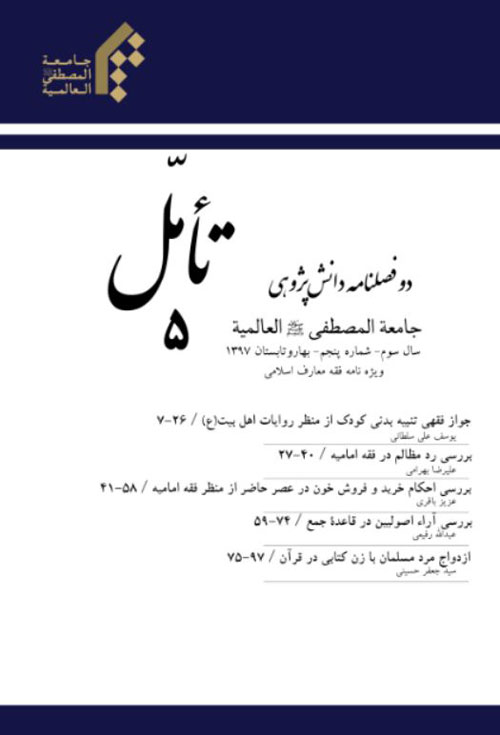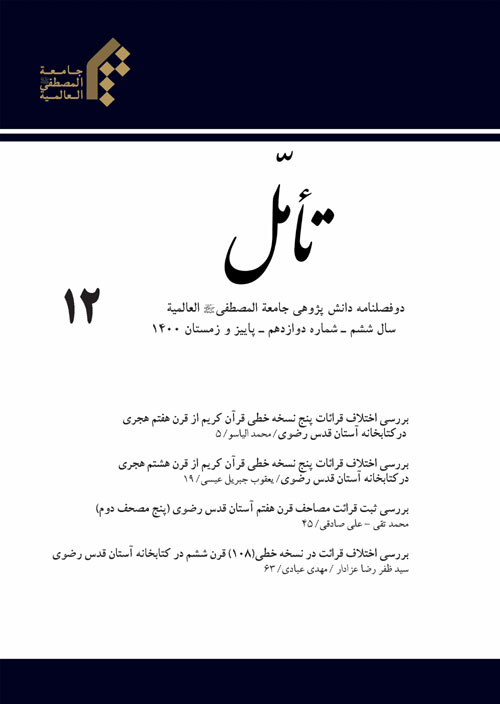فهرست مطالب

نشریه دانش پژوهی تامل
پیاپی 5 (بهار و تابستان 1397)
- تاریخ انتشار: 1397/06/01
- تعداد عناوین: 6
-
صفحات 7-26دین اسلام روش های بسیار زیادی را برای تربیت کودک از جمله: مهر و محبت، تشویق و پاداش، ترغیب و متمایل ساختن کودک به کارهای شایسته و... پیش بینی نموده است که تنبیه، یکی و آخرین روش تربیت کودک در صورت موثر نیفتادن روش های قبلی است. علماء فقه، علوم تربیتی و روان شناسان با اختلاف نظری که دارند ولی در کل، تنبیه بدنی را به عنوان آخرین روش تربیتی به رسمیت می شناسند و حتی در بعضی موارد، آنرا ضروری می دانند. مقاله حاضر با واکاوی در روایات فقهی مربوطه از منابع روایی شیعی، به خصوص وسایل الشیعه، مستدرک و بحار و مطالعه دیدگاه های فقها، در صدد پاسخ گویی به این سوال است که آیا تنبیه بدنی کودک مبنای شرعی دارد؟ و نظریه علمای علوم تربیتی چیست؟. بررسی روایات وارده از حضرات معصومین(ع) در این باب اکثرا از جواز تنبیه بدنی کودک البته توسط افراد معینی مانند پدر، معلم، وصی و وکیل پدر در حد محدودی مثل سه ضربه(معلم) و شش ضربه(پدر و وصی) و در موارد مشخصی از جمله تربیت و تادیب، حکایت دارند.کلیدواژگان: تربیت، تنبیه، کودک، روایات تربیتی، تنبیه بدنی، تنبیه مجاز
-
صفحات 27-40یکی از اتفاقاتی که ممکن است برای هر شخصی در زندگی رخ دهد طلب و دینی است که بر عهده او می ماند و گاه این طلبکاری به دلایل مختلفی مغفول واقع شده و حتی صاحبانش از دنیا می روند و یا به هر دلیل دیگری امکان ادای این دین فراهم نخواهد شد. از منظر دین مبین اسلام این موضوع باعث برطرف شدن این حق نخواهد شد و این دین کماکان بر گردن شخص خواهد بود و چون منشا به دست آمدن آنها ظلم و تجاوز عمدی یا سهوی بوده است، به آن ها مظلمه و مظالم عباد گفتهاند. این موضوع در مقوله ای به نام "رد مظالم" پاسخ داده می شود. در این اثر گردآورنده ضمن بررسی واژه مظالم در لغت و اصطلاح،به بیان مباحثی از قبیل ضرورت و اهمیت رد مظالم، تفاوت مظالم با مال مجهول المالک،حدود و موارد مظالم، جایگاه حقوق مردم در قرآن و روایات، تعریف مظالم در لسان فقها، برخی احکام فقهی رد مظالم، و نظر برخی از مراجع معظم تقلید در این باره می پردازد.کلیدواژگان: رد مظالم، مظالم، مال مجهول المالک، فقه امامیه، حق الناس
-
صفحات 41-58یک از مسائل مهم فقهی مسئله خرید و فروش خون است که به عنوان یک مسئله مستحدثه قابل طرح و بررسی میباشد، با توجه به اینکه در صدر إسلام و بعد از آن در زمان متقدمین فقهای شیعی إستفاده محلله از خون رایج نبوده، دلائل فقهی و فتوای فقها بیانگر حرمت آن است، اما از آنجای که امروز در خون به ویژه در خون انسان منافع کشف شده است، می توان این پرسش را مطرح کرد که اصولا مفاد ادله حرمت چیست، و گستره آن تا به کجاست؟ وآیا استفاده خون انسان را به خصوص در امور پزکی نیز شامل میشود؟ بر فرض جواز بهره برداری آیا معامله خون جایز است؟ با توجه به ادله حرمت و جاویدانگی احکام آیا زمان و مکان تاثیر در احکام شرعیه دارد؟ در نوشته حاضر بعد از مفهوم شناسی واژگان، در ابتداء به کلیات و شرائط عمومی انعقاد خرید و فروش خون و در بخشی بعدی به مفاد و گستره ادله حرمت خون و در بخش اخیر مفاد و گستره ادله جواز مورد برسی قرار گرفته است که در نهایت بعد از تبین دقیق إدله حرمت وجواز از ابعاد مختلف مورد بررسی قرار گرفته و نتیجه آن تبین خواهد شدکلیدواژگان: حکم، خرید و فروش، خون، فقه امامیه
-
صفحات 59-74یکی از مهمترین مباحث اصول فقه، مبحث تعارض ادله است که در منابع اصولی، همواره بابی به آن اختصاص داده شده و از جمله مباحث آن چگونگی جمع است که تحلیل و برداشت درست از این مبحث، ضامن اجرای صحیح دستورات شارع مقدس است. قاعده جمع، بین دلالت دو دلیلی مطرح است که شرایط حجیت در هر دو (از نظر سند و دلالت) کامل باشد و در نگاه اول میان آن ها تعارض مشاهده شود، براساس این قاعده، جمع کردن بین آنها بهتر از طرحشان است. به طور معمول بحث در این قاعده در دو مقام است. 1- مراد از جمع چه نوع جمعی است. 2- ادله آن کدام است؟ یکی از انواع جمع، جمع تبرعی است و مراد از آن رفع تنافی بین دو دلیل یا چند دلیل متعارض بدون شاهد و قرینه ای بر آن. قاعده جمع شامل جمع تبرعی نمی شود؛ به دلیل آنکه این نوع جمع به تاویل کیفی برمی گردد و دلیلی بر اعتبار این جمع وجود ندارد و گرنه موردی برای تعارض دو دلیل باقی نمی ماند. جمع عملی به معنای عمل به مفاد دو یا چند دلیل متعارض به صورت تبعیض در امتثال است. این جمع نیز خارج از این قاعده است؛ زیرا مستلزم مخالفت قطعیه عملیه با هر دو دلیل است و موجب هرج و مرج در فقه می شود. بنابراین قدر متیقن از این قاعده، جمع عرفی است، جمع عرفی، جمعی است که مطابق قواعد زبانی و مورد قبول اهل لسان و عرف می باشد و برای اثبات آن از کتاب، سنت، عقل، اجماع وسیره عقلا استدلال شده است.کلیدواژگان: تعارض، جمع، اولویت، طرح، دلیل لفظی، تعادل، تراجیح
-
صفحات 75-97در حال حاضر، به دلیل گستردگی حوزه سکونت مسلمین، مهاجرت و گسترش روابط با سائر ملل و ادیادن جهان، بر هر مسلمانی لازم است که بداند: قرآن کریم، جواز ازدواج مردان مسلمان، با زنان عفیف و پاکدامن اهل کتاب را تایید و هر گونه پیوند زناشویی مردان و زنان مسلمان، با مشرکان را نفی نموده است. این قلم، روشن ساختن زوایای گسترده موضوع فوق را رسالت خود دانسته و در خلال مباحث، از چگونگی جواز ازدواج مرد مسلمان، با اتباع ادیان آسمانی و غیر الهی، سخن گفته است.کلیدواژگان: احکام ازدواج، غیر مسلمان، اهل کتاب، قرآن کریم، نسخ آیات
-
صفحات 100-104
-
Pages 7-26Islam has considered several ways for training the children, including: compassion and kindness, encouragement and awarding, making the children to do good actions, etc. and chastisement is the last one when the other ways did not work. The scholars of jurisprudence, educational sciences and psychology despites having disagreements unanimously accept physical chastisement as the las sort and even occasionally consider it necessary. The present paper has tried by studying the statements of the jurists and the jurisprudential Hadiths from the Shiite sources like “Wasa’el Al Shi’a”, “Mustadrak” and “Bihar” to answer the question that if the physical chastisement of the child has a religious base? What is the idea of the scholars of educational sciences? The study of the statements of the Infallibles (AS) show the legitimacy of physical chastisement of the child by certain persons, like father, teacher, executor and the father’s agent to a limited extent like three strokes (for teacher) and six strokes (for father and executor) for certain purposes like educating and training.Keywords: training, chastisement, child, training Hadiths, physical chastisement, legitimate chastisement
-
Pages 27-40One of the incidents that may occur for any person during the life is a debt on him/her that sometimes becomes forgotten and the owner may has passed away or is not accessible due to other reasons. According to Islam, this debt remains on the person and since the source of obtaining the property has been intentional or unintentional cruelty and violation, the debts are called “Madlamah” or “Madalim” (Plural of “Dulm” i.e. cruelty or injustice). The issue is discussed under the title of “Radde Madalim” (return of the above mentioned debts). The present paper has studied the term of “Madalim” lexically and idiomatically in addition to issues like: necessity and importance of Radde Madalim, the difference between Madalim and the property with unknown owner, the extent and the cases of Madalim, the position of the rights of people in the Qur’an and the Hadiths, the definition of Madalim in the statements of the jurists, some jurisprudential rules of Radde Madalim and the opinions of some prominent jurists.Keywords: Radde Madalim, Madalim, unknown owner property, Imamiah jurisprudence, right of people
-
Pages 41-58One of the important jurisprudential issues is the sale of blood that is discussable as new problem. Given that in the beginning of Islam and after that at the time of early Shiite jurists the legitimate use of blood has not been usual, the jurisprudential sources and Fatwas show its illegitimacy. But since nowadays there are several benefits and uses have been discovered in the blood especially human blood, it can be asked that what is the real meaning of the reasons considered to prove prohibition of the issue and to what extent they apply? Do they include the human blood especially in medicine? In the case of legitimacy of use, is the sale of blood permitted? Given the reasons of prohibition and eternality of the Islamic rules, do time and conditions affect the Islamic rules? The present paper after defining the terms, at first has studied the general conditions of concluding the sale of blood and then the content and extent of the reasons of its prohibition and finally has discussed the content and extent of its legitimacy.Keywords: : edict, sale, blood, Imamiah jurisprudence
-
Pages 59-74One of the most important issues in the Islamic jurisprudence bases in the problem of conflict of the reasons that has always occupied a chapter in the books of the subject among the issues of which are the ways of reconcilement the true understanding and analysis of which can guarantee the accurate application of the Islamic orders. The principle of Reconcilement applies between two reasons the validity of which is complete (in terms of both the document and the implication) and at the first glance they seem to be contradictory but reconcilement of them is better than rejecting them. The controversy about the principle usually arises about two matters: 1. what kind reconcilement is meant by Reconcilement? 2. What are the proofs of it? One kind of the reconcilement is reasonless reconcilement that is solving the conflict between the two reasons with no evidences. But this principle does not include this kid of reconcilement, since it refers to qualitative justifications for validity of which we have no proof; otherwise there were never conflicts between reasons at all. Another kind of reconcilement is the practical one that is partial application of the both conflicting reasons. This one is also out of inclusion of the principle; since it leads to definite disobedience of the both the reasons and entails a kind of chaos in jurisprudence. Therefore, the customary reconcilement is intended by the principle. Customary reconcilement is a reconcilement in accordance with the language rules and accepted by the people of the language and the community. They have argued by the Qur’an, tradition, logic and the manner of the intellectual to prove this principle.Keywords: conflict, Reconcilement, priority, rejection, verbal reason, equality, preferences
-
Pages 75-97Nowadays due to the vast scope of residence of the Muslims, migration and spreading relations with other nations and religions of the world, it is necessary for any Muslim to know that the Qur’an has confirmed the marriage between the Muslim men and the chaste women of Ahl Al Kitab (those believing in the Bibles) and prohibited any matrimony between Muslims and the unbelievers. The present paper has tries to explore the different aspects of the issue and explain the ways of legitimacy of marriage of the Muslim man with the followers of the other Heavenly religions.Keywords: the rule of marriage, Non-Muslim, Ahl Al Kitab, holly Qur’an, nullification of the verses


